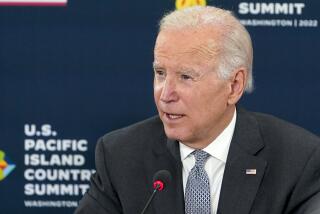U.S., Japan Urged to Take Lead in Pacific : Nakasone Calls for Cooperation
- Share via
Former Prime Minister Yasuhiro Nakasone of Japan called Monday for greater economic cooperation among the countries of the Pacific region, with the United States and Japan taking the lead.
In a speech he delivered at a dinner at the Biltmore Hotel, Nakasone repeated the proposal he made last week in San Francisco to form a Pacific Forum for Economic and Cultural Cooperation that would be opened to any country in the Pacific region.
“The idea is to strengthen the overall interdependence among the countries and areas in accordance with the level of economic development of each of them in the fields of financial resources, goods, manpower and information technology,” Nakasone said.
Nakasone said the United States, Japan and other countries in Asia must respond quickly to the structural changes occurring in the economies of each nation.
“By simply making an optimistic statement that the 21st Century will be the age of the Pacific is to ignore many obstacles that in reality stand in the way of attaining the ideal of a new civilization,” he said.
Nakasone, the keynote speaker of a two-day conference entitled “Pacific Future,” echoed the sentiments of other participants who warned that fast-growing Asian countries are too dependent on the U.S. market for their exports. They also advised that Japan should increasingly absorb some of the products coming out of these nations.
In his dinner address, Nakasone said the export-generated growth of Asia has resulted in huge external trade imbalance among the United States, Japan and the newly industrialized countries (NICs) of Taiwan, Singapore, South Korea and Hong Kong.
“It is clear that the external imbalance is caused mainly by the fact that the U.S. market is no longer able to serve as the huge shock absorber that it once was.”
He said the changes in economic fundamentals require new initiatives and specifically outlined three.
First, the United States, Japan and the NICs--Taiwan, Singapore, South Korea and Hong Kong-- must strengthen their bilateral and multilateral coordination. He proposed the establishment of a regular consultation process among the NICs and the developed countries.
Secondly, Nakasone said, each country should move quickly to liberalize its market but at a rate deemed adequate to the respective economies. Using Japan as an example, he said, “While the pace of our market liberalization may seem to be irritatingly slow to American eyes, I hope that you understand that the Japan of today is definitely moving toward market liberalization and import promotion.”
To ease the opening of markets, he supported the creation of a Pacific Free Trade Zone that would be similar to the recently established U.S.-Canada Free Trade Zone. Nakasone explained, “The idea is to create a loose association at the beginning as a means to bring out more of the dynamism from the countries of the region and within the framework of multilateral free trade.”
“Thirdly,” Nakasone said, “an initiative is needed for the recycling of financial resources.” He cited the U.S. economic aid after World War II and said Japan and other Asian countries should now invest their surpluses in cooperative ventures.
Earlier in the day, Bobby R. Inman, president and chief executive of Westmark Systems Inc. and former deputy director of the CIA, told conference participants that the rapid transformation of the Asian countries over the past 40 years has meant new lessons for the United States.
He said Americans want quick solutions to problems, but they are now dealing with countries that make decisions on a consensus basis and use capital formation policies that contrast sharply with the U.S. system.
But he added, “Not all the problems lay offshore.” American productivity, for example, he said, continues to lag far behind Asia. “We’ve got to find way through these problems collectively.”
The conference, which continues today, is sponsored by Times Mirror, the Los Angeles Times, the Foundation for Advanced Information and Research in Japan and the Pacific Basin Institute. Conference topics included Pacific trade patterns, technology developments, the politics of trade and investment flows.
More to Read
Sign up for Essential California
The most important California stories and recommendations in your inbox every morning.
You may occasionally receive promotional content from the Los Angeles Times.










